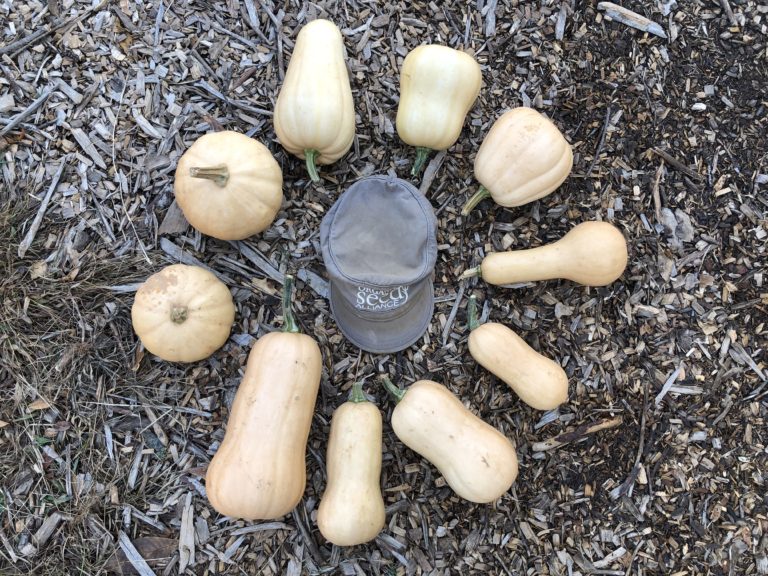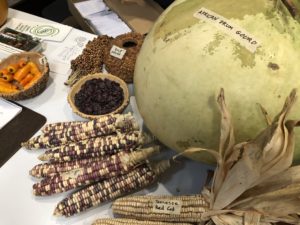
Thanks to Melissa DeSa of Working Food for contributing this guest blog post. Melissa oversees the organization’s Southern Heritage Seed Collective and youth garden initiative. She’s passionate about preserving southern seed biodiversity, and also serves on the advisory board for both Southeast Slow Food Ark of Taste and Southern SARE.
The first Southeast Organic Seed Summit was held last weekend in conjunction with Carolina Farm Stewardship’s Sustainable Agriculture Conference in Durham, NC. The goal was to gather stakeholders in the region around the most fundamental piece of a resilient food system: seed! Participants convened to continue conversation and identify actions around building a Southeastern network that would help expand the quantity, quality, and diversity of organic seed produced in the region, and ultimately enhance organic farming systems by bolstering regional seed security.
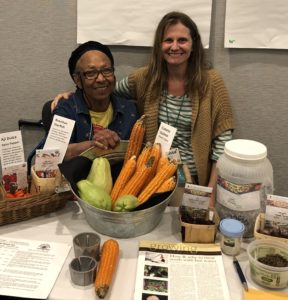
I am a fairly new face to the seed world, although I’ve been actively involved in seed work for several years. As I started to learn more and go deeper down this path, there seemed to be great networks and resources around the rest of the country, but a relative lack of connection and collaboration in the Southeast. Especially being all the way down here in Florida, it feels isolating and disconnected from others in the seed world in the other Southeastern states. For a few years, I’ve envisioned a dynamic network reflecting the diversity in our region of growers at all scales, chefs, local businesses, plant breeders, researchers, extension agents, seed producers, seed companies, community seed savers, educators, and nonprofits — all bringing to the table their skills and knowledge to steward and improve good seeds for our climate and culture.
The problem is that it doesn’t really exist — at least yet. But there are many incredible people and organizations in this region doing important work already, many of them showing up last weekend. The lack of organizing and connection of these pieces was the impetus for this first ever Southeast Organic Seed Summit — and it’s been a long time coming! Organic Seed Alliance conducted a survey of over 500 Southeastern growers and other stakeholders and found that many of them “feel hamstrung by the lack of regionally appropriate variety choices. The varieties available from western and northeastern seed companies frequently do not thrive with the pest, disease, and climate challenges of the Southeast.” Over 80% felt that seed education and research for the Southeast was urgent or very important. I agree.
It seems the summit attendees felt the same, too, showing up ready to share their opinions, ideas, and resources, and, importantly, to take action to build this much needed network. Fifty people were in attendance, including presenters at the pre-conference intensive on Friday, titled: “Growing Seed in the Southeast.”
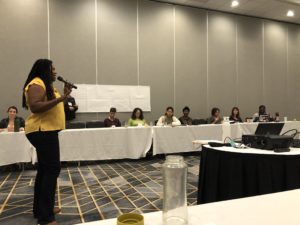
A listening and visioning session facilitated by OSA’s Jared Zystro and educator Craig LeHoullier fleshed out some important strengths, weaknesses, and opportunities in our region. Attendees included a range of experiences and perspectives within the seed community, including seed companies, farmers, plant breeders, market farmers, home garden seed savers, non-profits, and community activists.
Jovan Sage led a conversation around the importance of acknowledging our cultural history in the seeds we save and share. We reflected on the brutal past of our nation and region that marginalized and erased the history of Indigenous peoples and African Americans and their role in our food culture and current food systems. I was so grateful this was part of the summit, and look forward to keeping that elevated in all current and future seed work. She reminded us that “your culture is your seed.”
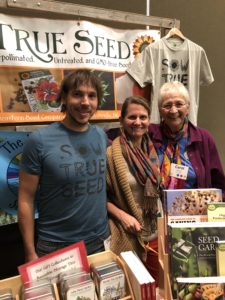
In addition to the Friday intensive, and seed topics in each track throughout the weekend’s conference, many pop-up conversations in the hallway and around the seed swap table continued to gather energy and ideas. Needs identified were many, including:
- Increased support for on-farm breeding,
- Collaborative variety trials,
- Shared and improved resources and data for best practices on seed production
- Incorporating community and culture into seed work through marketing and outreach, and
- Face to face networking and connections.
While we have a lot of work ahead of us, some actions have already been initiated. The notes and contacts are being compiled. A listserv has been created and is already being used. And a poll was distributed to find a time for our next meeting over the phone to begin discussing next steps. I envision that some leaders will emerge that are ready to roll up their sleeves to help organize this effort. We’ve only just begun, and so now is a good time to get involved! You can email Jared Zystro to get on the listserv and get access to the shared resources. Stay tuned for for developments as we continue to grow.
